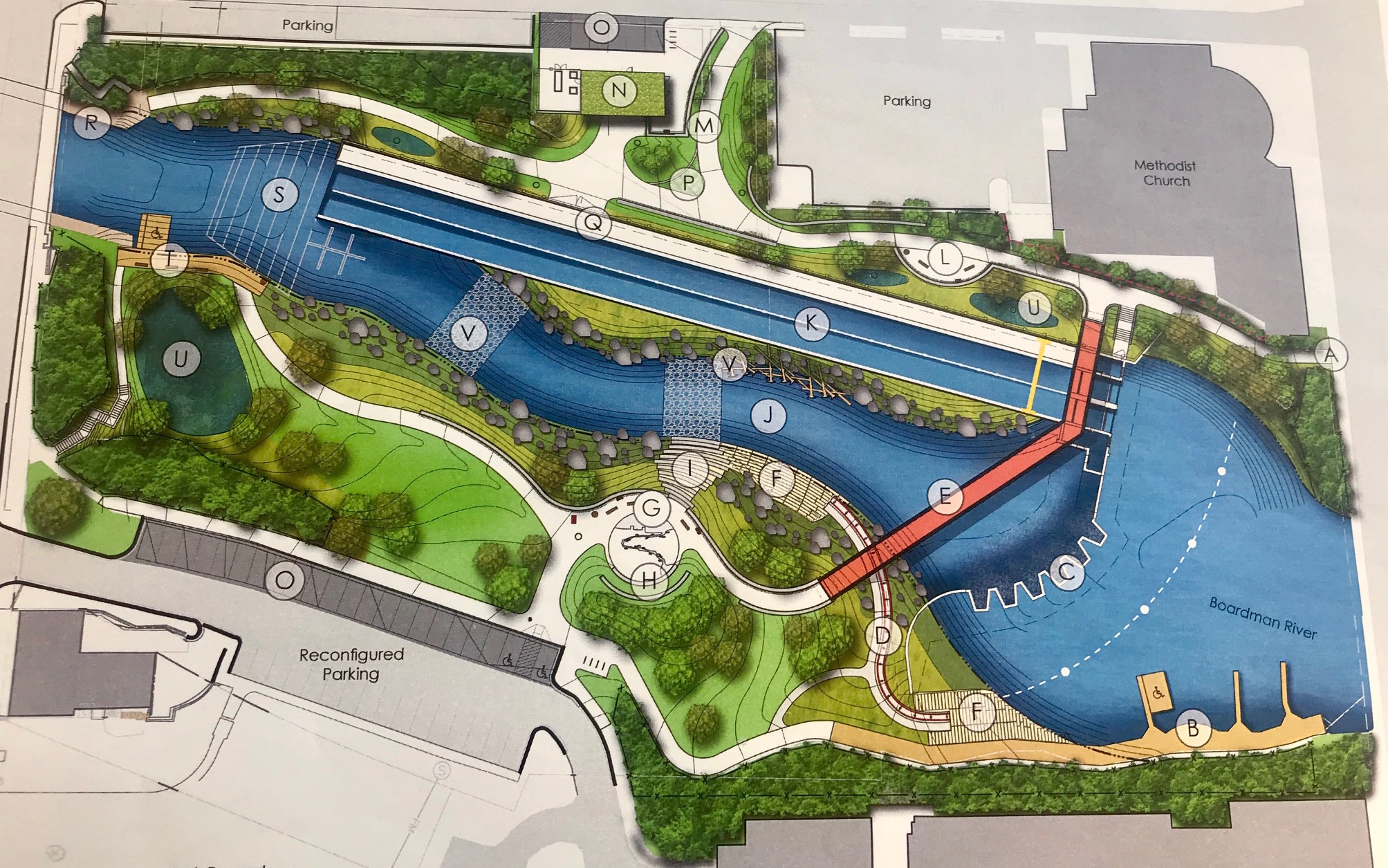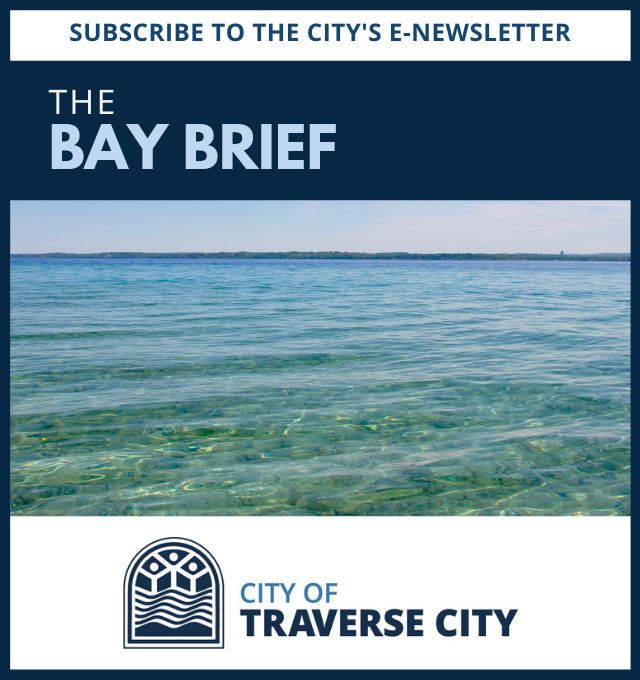
$18 Million Experimental FishPass Details Emerge, Including New Amphitheater
By Beth Milligan | Nov. 21, 2018
The Great Lakes Fishery Commission (GLFC) unveiled more details Tuesday on the proposed design for the experimental FishPass system set to replace the deteriorating Union Street Dam in downtown Traverse City. The project, expected to cost $18-22 million, is hoped to transform the area around the dam site.
GLFC representatives appeared before both the Lower Boardman River Leadership Team and the Traverse City Planning Commission Tuesday to give an update on FishPass, a first-of-its-kind scientific research project that will test out multiple fish-sorting technologies to pass desirable species up the Boardman River and keep out invasive sea lampreys. Traverse City was selected from among a dozen potential sites for the project, which researchers believe will provide scientific breakthroughs that could help waterfront communities around the world better combat invasive species.
Following more than 62 GLFC presentations and at least three public workshops since the project was announced in 2016, feedback gathered from local leaders and residents - including local fishing and angler groups - helped shape the latest design for FishPass (pictured). The site layout, created by engineering firm AECOM, will be “primarily focused on two main channels,” according to GLFC Computational Scientists and Engineer Dr. Dan Zielinski, including a fish-sorting channel to the north “where the majority of research is going to be taking place.” The concrete flume will be 30 feet wide by 400 feet long and will feature removable partitions along its length to allow scientists to segment the channel for research. On the south side of the Boardman, a nature-like bypass channel will be constructed with capacity to pass the entire water flow of the river – a protective measure against flooding – and accommodate recreational use.
The existing Union Street Dam is located approximately mid-way through the property site; under the new design, water control measures will be moved 150 feet upstream, with an ADA (Americans with Disabilities Act)-compliant pedestrian bridge constructed overhead. The bridge will mirror the weathered steel and wood decking design of the Pine Street Pedestrian Bridge in the Warehouse District and allow for north-south crossings of the Boardman, as the current pedestrian path over the Union Street Dam does today. According to GLFC, the new 75-foot-long weir will be “significantly more safe” than the existing dam because it won’t generate “dangerous hydraulic conditions” downstream that can affect boaters or kayakers. The more efficient mechanisms of the new system will also reduce water fluctuations in the river’s upstream pool by half, Zielinski said.
Numerous recreational and educational components are also proposed for the new FishPass site to encourage more public use of the property. ADA-compliant boat landings will be placed both upstream and downstream of the weir, with east-west ADA-pathways also running along both sides of the river and connecting to parking lots on either bank. A new kayak takeout area will be constructed on the south side of the river, with a kayak slide installed on an erosion-protected platform that will allow kayakers to push their kayaks along the slide and over to the other side of the dam for easy portage. The south side will also host an outdoor classroom and amphitheater space to allow for educational and public events. The amphitheater was added to the design after feedback from residents, Zielinski said, calling the feature a “big desire by the public.”
The project design also calls for the construction of a new research and education center on the north end of the property in the former Consumers Energy lot. Traverse City’s Downtown Development Authority (DDA) board recently approved buying the parcel from Consumers Energy at a reduced cost of $120,000 – the site was valued at over $500,000 – specifically for the FishPass project. The new research and education center will feature lab and office space for researchers, parking, and two public restrooms. Multiple river overlooks are also proposed to be constructed throughout the dam property, along with rain gardens and stream habitat and riffles. The south parking lot along River’s Edge Drive and Lay Park will also be reconfigured as part of the redesign.
According to GLFC, the new design is considered 65 percent complete; the core components are unlikely to change, representatives said, but the project will now go through a review process by several bodies that could result in tweaks before it’s finalized. The U.S. Army Corps of Engineers and Michigan Department of Environmental Quality will review the design next, as will an independent “expert peer” board. The design is expected to be finalized in 2019, with the project likely going out for bid in 2020 and construction either beginning in late 2020 or early '21. Full construction of FishPass is likely to take two construction seasons, or up to 24 months.
Cost estimates for the project are $18 to $22 million including construction, observation, and contingencies, according to GLFC. Science Director Dr. Andrew Muir said the Environmental Protection Agency (EPA) has already committed $12 million through Great Lakes Restoration Initiative funding – $6 million in 2019, and $6 million in 2020. He said the group hoped to close the funding gap through other federal, state, and local grants, as well as philanthropic and foundation donations. But he indicated the EPA was “strongly interested in funding this project” and could be a potential backup for the rest of project costs if other sources fall through. “They’re very supportive…(and) I’m not sure it would be in their best interest to fund three-quarters of a project,” he said. Traverse City Director of Public Works Frank Dituri also noted the Army Corps “requires those dollars to be in place” before construction is allowed to begin on the FishPass project.
Both GLFS and Traverse City officials expressed hope the project would be a transformative one for the Union Street site. City Planning Director Russ Soyring pointed out the redesign could help better connect the dam property to surrounding public parcels, contributing “much more to the importance and value of these individual smaller parks that we have in this area.” Marc Graden, communications director and legislative liaison for GLFC, said FishPass was a “one-of-a-kind project” that would bring a working scientific research center that's open to the public as well as recreational amenities to the heart of downtown. “It’s a huge opportunity to have (the Union Street Dam property) be a purpose destination for people,” Graden said.
Comment






